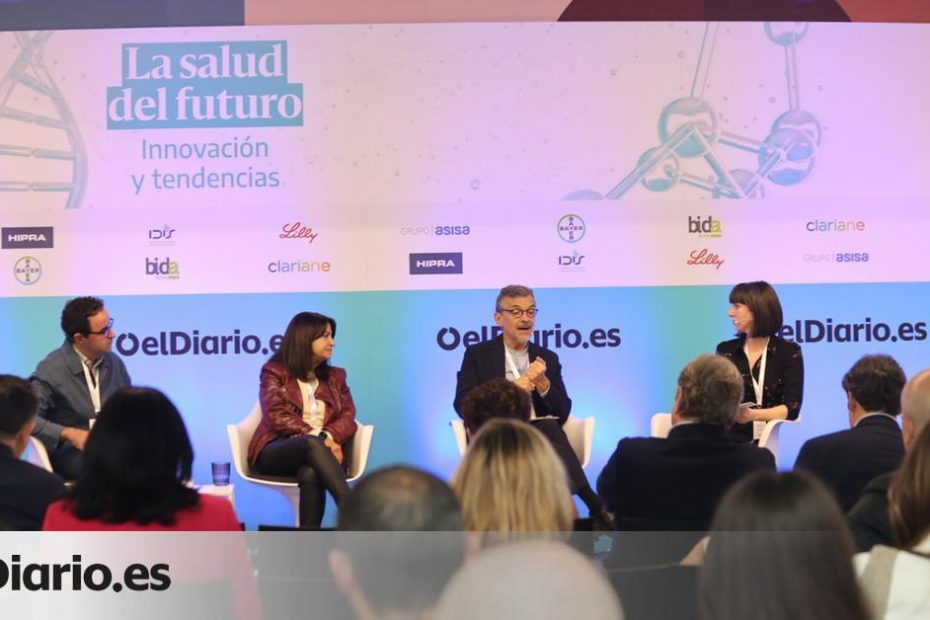Guaranteeing the sustainability of public health, the challenges posed by psychiatric care and the new tools available to professionals were discussed at the start of the conference ‘The health of the future: innovation and trends’, organized by elDiario .es with the participation of experts and professionals and in which the Minister of Health, Mónica García, participated in conversation with the director of elDiario.es Ignacio Escolar.
Now and in the future, primary care must be the “heart” of a public health system that is a “luxury,” the minister highlighted, prior to a debate table on the present and future of mental health in the that the participants have reflected on the growing needs of society in this area.
Present and future of mental health
The degradation of the first step of health care has no culprits, according to García, but rather those responsible. A nuance that does not hide the fact that in some cases “bad faith on the part of those who do not believe in the public system,” he pointed out. García has pointed to the social determinants of health as a determining factor in the prevalence of mental pathologies in recent years, an issue that has been discussed in depth in the first panel of the day, Present and future of mental health. The Government’s Mental Health Commissioner, Belén González, has not put in hot water. Social situations such as difficulties in accessing housing and job insecurity have overwhelmed the assistance system to the point of overflowing it, so that it is currently “broken.”
“We professionals are overwhelmed,” said Mayelin Rey, clinical psychologist at the Ramón y Cajal hospital in Madrid and member of the board of directors of the region’s college of psychology. In this sense, the low rate of professionals per inhabitant in Spain has been referred to, six per 100,000 inhabitants, compared to the 12 to 18 in other surrounding countries. The diagnosis is shared by Santiago Pérez, director of the Psychology Unit at the HLA Montpellier Hospital and psychologist at the HLA Moncloa Hospital. “There is overflow even in the private sector,” he said.
“We have more resources than before, but they are not enough,” agreed Daniel Navarro, technical coordinator of mental health at Clariane Spain, in an intervention online with his table companions and in which circumstances such as the need to managing expectations of the effects of drugs, the need to reinforce community work and introduce psychological care in primary school or the risk of medicalizing normal situations such as sadness due to grief in the face of the rise of information and citizen interest in mental health .
Health and nutrition
The second panel discussed concerns about nutrition and the increase in obesity, especially in childhood. The director of the cabinet of the Minister of Health, José Manuel López Rodrigo, has explained that the Government’s strategy involves an “ecosystem logic”, in which all ministries are involved.
Issues such as breastfeeding, the need to reconcile family life or mobility require this joint approach. “Obesity is a reflection that something is happening with lifestyle factors,” said Santiago F. Gómez, global director of Research and Programs at the Gasol Foundation.
Ascensión Marcos, CSIC Research Professor, founder of the Immunonutrition Group and president of the International Society for Immunonutrition, has regretted that community projects for the prevention and treatment of obesity in children with very promising results do not have long-term continuity due to lack of financing. It has also warned about the difficulties posed by the proliferation of unscientific theses on weight and nutrition spread by influencers on social networks. “They do nothing but send hoaxes,” he warned. Against this, the Gasol foundation promotes the figure of “ambassadors” who promote scientifically proven habits.

López Rodrigo recalled that the Aladino study is underway, which collects data on the nutritional status and development of children between six and nine years old, or the pilot project to enable schools and institutes in the afternoons for physical activity and nutrition, based in a successful Icelandic experience, and which is intended to be generalized by 2030. The three speakers also agreed on limiting the advertising of “unhealthy” foods and energy drinks.
